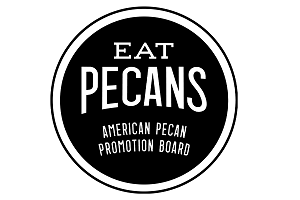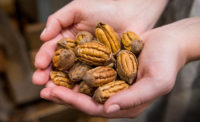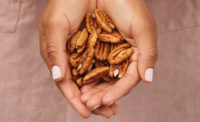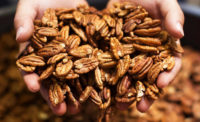You know what’s nuts? The raw nutrition found under the shell and in the delicious meat of a pecan. Historically, the nut has been relegated to the baking aisle, sweet snacks and seasonal holiday fare.
But this nut has been expanding applications and is the ideal addition to upcoming product launches.
Like other nuts, pecans contain primarily unsaturated fats (18g of monosaturated fat, including oleic acid, and only 2g of saturated fat), but they’re among the highest in monounsaturated fats, especially the beneficial oleic acid that’s found in olive oil (USDA National Nutrient Database for Standard Reference).
In fact, observational studies have found an association between total nut consumption (peanuts and tree nuts) and a significantly decreased risk of heart disease. The greatest reduction of heart disease risk and deaths from heart attacks was among people who ate five or more one-ounce servings of nuts per week.*
Given the nutrition benefits of the nut, 67% of consumers feel better purchasing an indulgent food containing pecans according to Datassential.
Pecans have cracked five of the top consumer food trends:
1. Keto: Many nuts can help keep eaters in ketosis. An ounce of pecans (about 19 halves) has about 4g total carbs and 20g total fat.
2. Superfoods: The word “superfood” was added to the Merriam-Webster Dictionary less than 10 years ago as a nutrient-rich food considered to be especially beneficial for health and well-being — with Mintel tracking “super growth” in the category as early as 2016. And pecans are on the traditionally-accepted list of the seven superfoods of the world with multiple health-promoting nutrients and bioactive compounds. Thanks, in part, to antioxidant vitamins like beta carotene and a trio of essential minerals — manganese, copper and zinc. (8mcg of beta carotene, or provitamin A 7mg gamma-tocopherols, a form of vitamin E).
3. Gluten-free: Like all tree nuts, pecans are naturally free of gluten. They can be used as a flour substitute with 11% daily value of dietary fiber per one ounce serving.
4. Plant-Based + Vegan: According to the Mintel Global New Products Database, new consumer plant-based packaged goods have grown by nearly 700% over a six-year period and accounted for 12% of launches in 2021. And, look at pecans, with 10mg of phytonutrient flavonoids, 35mg of plant sterols, and 3g of plant-based protein per one ounce serving.
5. Dairy-free: From creamy mouthfeel, to buttery spreads that hit the craving-spot, to creamers with thickening properties — pecans can be a satisfying alternative to dairy.
If you’re looking to add these super nuts to your next snack, frozen, meatless or dairy-free product launch, shelled pecans can be purchased in bulk in a variety of wholesale-food-industry options and formats. Product developers also can use pecans to add texture or as a binding, thickening or extending agent where the nuts aren’t featured as a star ingredient.
And there are so many ways to package this mighty nut — over 1,000 varieties are available in sizes from halves to chopped to meal. To source pecans for new product innovations, go to eatpecans.com/sheller-directory.
*Scientific evidence suggests but does not prove that eating 1.5 ounces per day of most nuts, such as pecans, as part of a diet low in saturated fat and cholesterol may reduce the risk of heart disease. A 1oz serving of pecans has 12g of "good" monounsaturated fat and only 2g saturated fat. Observational studies establish associations, not causality, and not all findings from observational studies have been confirmed in controlled, randomized clinical trials.






